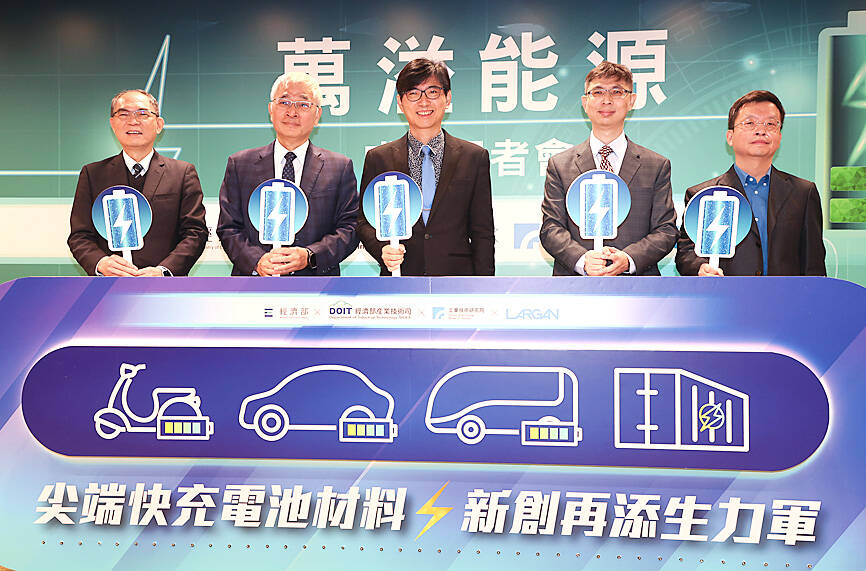Largan Precision Co (大立光) has formed a joint venture with the Industrial Technology Research Institute (ITRI, 工研院) to produce fast-charging, long-life lithium-ion batteries for electric vehicles, mobile electronics and electric storage units, the camera lens supplier for Apple Inc’s iPhones said yesterday.
Largan Energy Materials Co (萬溢能源材料), established in January, is developing high-energy, fast-charging, long-life lithium-ion batteries using titanium niobium oxide (TNO) anodes, it said.
TNO-based batteries can be fully charged in five minutes and have a lifespan of 20 years, a major advantage over the two to four hours of charging time needed for conventional graphite-anode-based batteries, Largan said in a joint statement.

Photo: CNA
The TNO-based batteries are also considered to be more suitable energy solutions for electric buses, power storage devices, hybrid vehicles, stackers and drones, the statement said.
The value of the global lithium-ion battery market is forecast to climb to US$450 billion in 2030, Largan said, citing McKinsey & Co’s research.
Largan Precision owns about 20 percent of Largan Energy Materials, with an investment of NT$450 million (US$14.33 million), according to registration information on the Ministry of Economic Affairs’ Web site.
The government-funded ITRI holds the remaining 80 percent stake in the venture.
“The collaboration with ITRI shows the company’s confidence in lithium-ion batteries using TNO anodes. The company also has high confidence about applying the batteries to different applications,” Largan president Huang You-chih (黃有執) said.
Largan Energy Materials plans to build a pilot-run production line at Largan Precision’s headquarters in Taichung this year, with an initial annual capacity of 24 tonnes.
By 2026, its aims to boost capacity to 600 tonnes, Huang said.
Lithium-ion batteries are essential for mobile electronics, electric vehicles and power storage systems, and the world’s major battery makers and researchers have been striving to develop new battery materials amid growing demand for safe batteries with a long lifespan, ITRI executive vice president Chang Pei-zen (張培仁) said.
The Department of Industrial Technology has invested NT$1 billion over the past five years in scientific research on developing fast-charging, solid-state lithium-ion batteries and low-carbon-emission process technologies, the ministry said.

EARLY TALKS: Measures under consideration include convincing allies to match US curbs, further restricting exports of AI chips or GPUs, and blocking Chinese investments US President Donald Trump’s administration is sketching out tougher versions of US semiconductor curbs and pressuring key allies to escalate their restrictions on China’s chip industry, an early indication the new US president plans to expand efforts that began under former US president Joe Biden to limit Beijing’s technological prowess. Trump officials recently met with their Japanese and Dutch counterparts about restricting Tokyo Electron Ltd and ASML Holding NV engineers from maintaining semiconductor gear in China, people familiar with the matter said. The aim, which was also a priority for Biden, is to see key allies match China curbs the US

The popular Taiwan Semiconductor Manufacturing Co (TSMC, 台積電) arbitrage trade might soon see a change in dynamics that could affect the trading of the US listing versus the local one. And for anyone who wants to monetize the elevated premium, Goldman Sachs Group Inc highlights potential trades. A note from the bank’s sales desk published on Friday said that demand for TSMC’s Taipei-traded stock could rise as Taiwan’s regulator is considering an amendment to local exchange-traded funds’ (ETFs) ownership. The changes, which could come in the first half of this year, could push up the current 30 percent single-stock weight limit

PROTECTION: The investigation, which takes aim at exporters such as Canada, Germany and Brazil, came days after Trump unveiled tariff hikes on steel and aluminum products US President Donald Trump on Saturday ordered a probe into potential tariffs on lumber imports — a move threatening to stoke trade tensions — while also pushing for a domestic supply boost. Trump signed an executive order instructing US Secretary of Commerce Howard Lutnick to begin an investigation “to determine the effects on the national security of imports of timber, lumber and their derivative products.” The study might result in new tariffs being imposed, which would pile on top of existing levies. The investigation takes aim at exporters like Canada, Germany and Brazil, with White House officials earlier accusing these economies of

Teleperformance SE, the largest call-center operator in the world, is rolling out an artificial intelligence (AI) system that softens English-speaking Indian workers’ accents in real time in a move the company claims would make them more understandable. The technology, called accent translation, coupled with background noise cancelation, is being deployed in call centers in India, where workers provide customer support to some of Teleperformance’s international clients. The company provides outsourced customer support and content moderation to global companies including Apple Inc, ByteDance Ltd’s (字節跳動) TikTok and Samsung Electronics Co Ltd. “When you have an Indian agent on the line, sometimes it’s hard